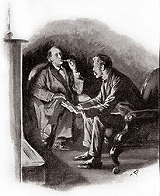IT WAS the end of November, and Holmes and I sat, upon a raw and foggy night, on either side of a blazing fire in our sitting-room in Baker Street. Since the tragic upshot of our visit to Devonshire he had been engaged in two affairs of the utmost importance, in the first of which he had exposed the atrocious conduct of Colonel Upwood in connection with the famous card scandal of the Nonpareil Club, while in the second he had defended the unfortunate Mme. Montpensier from the charge of murder which hung over her in connection with the death of her step-daughter, Mlle. Carere, the young lady who, as it will be remembered, was found six months later alive and married in New York. My friend was in excellent spirits over the success which had attended a succession of difficult and important cases, so that I was able to induce him to discuss the details of the Baskerville mystery. I had waited patiently for the opportunity, for I was aware that he would never permit cases to overlap, and that his clear and logical mind would not be drawn from its present work to dwell upon memories of the past. Sir Henry and Dr. Mortimer were, however, in London, on their way to that long voyage which had been recommended for the restoration of his shattered nerves. They had called upon us that very afternoon, so that it was natural that the subject should come up for discussion.

“The whole course of events,” said Holmes, “from the point of view of the man who called himself Stapleton was simple and direct, although to us, who had no means in the beginning of knowing the motives of his actions and could only learn part of the facts, it all appeared exceedingly complex. I have had the advantage of two conversations with Mrs. Stapleton, and the case has now been so entirely cleared up that I am not aware that there is anything which has remained a secret to us. You will find a few notes upon the matter under the heading B in my indexed list of cases.”
“Perhaps you would kindly give me a sketch of the course of events from memory.”
“Certainly, though I cannot guarantee that I carry all the facts in my mind. Intense mental concentration has a curious way of blotting out what has passed. The barrister who has his case at his fingers’ ends and is able to argue with an expert upon his own subject finds that a week or two of the courts will drive it all out of his head once more. So each of my cases displaces the last, and Mlle. Carere has blurred my recollection of Baskerville Hall. To-morrow some other little problem may be submitted to my notice which will in turn dispossess the fair French lady and the infamous Upwood. So far as the case of the hound goes, however, I will give you the course of events as nearly as I can, and you will suggest anything which I may have forgotten.